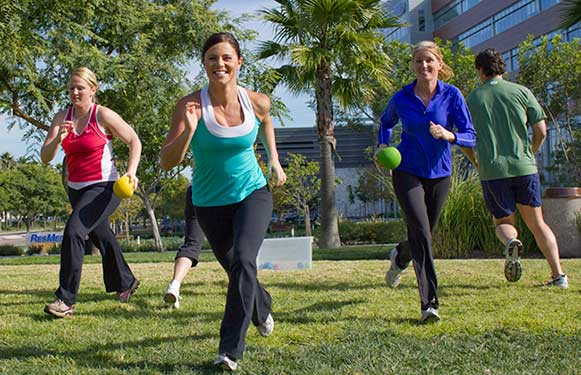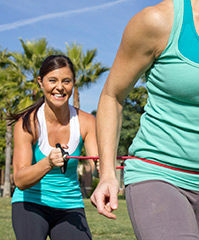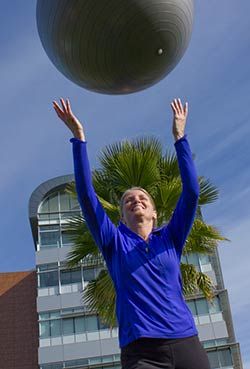
When was the last time you noticed one of your clients or group participants spontaneously laughing and cheering as they worked out? Sure, they probably show smiles of appreciation and amusement. But “cracking up” with laughter?
I had this thought recently while watching a pair of participants in my indoor boot camp–style class. The two women were laughing non-stop as they ran side by side, taking turns bouncing a stability ball around a simple obstacle course. They were playing—and they just happened to be working out, too.
Social Ice-breaker
To help participants in her BOSU classes get to know each other, Leanne Zdebiak-Eni, owner of Studio IPF: Inner Pursuit Fitness in Courtenay, British Columbia, plays the following game after completing the warm-up.
- Organize participants into groups of about five. Have each group set up their BOSUs in a circular formation (or simply stand in a circle if they aren’t using BOSUs). Each client stands on the BOSU (or floor) facing into the circle.
- Give each group one toning ball—about 3 to 5 pounds—or a small medicine ball. Cue participants to throw the ball randomly around the circle.
- As participants get comfortable with catching the ball and maintaining balance, ask them to say their name when they catch the ball as a way to introduce themselves.
- Next, have them say the name of the person they are throwing the ball to. “This is usually where the atmosphere in the room gets a bit louder, with lots of laughter,” says Zdebiak-Eni.
- For variations, clients can balance on one foot or add more people to the circle.
As fitness pros, we do our best to make exercise enjoyable, but quite often the “fun factor” that makes an exercise session truly special is only a small part of the equation, or missing altogether. “The fun factor in fitness boils down to one key strategy: Create an amazing experience,” says Trina Gray, who developed a six-week fitness and nutrition program called Corporate Challenge and owns Bay Athletic Club in Alpena, Mich.
While safety and appropriate exercise programming are always foundational to a good workout, weaving the fun factor into a class or training session usually has little to do with what you teach. Rather, it’s how you teach that resonates. “People remember more about how you make them feel and less about the exercises you select,” says Gray. With that in mind, here are ideas for infusing more fun into your training sessions, boot camps and/or fitness classes.
Entertain a Party Atmosphere
Any time you can make a class or group training session buzz with a party atmosphere, the fun factor naturally follows. So consider yourself a “party planner” for your classes and training sessions, says Gray. “Instructors and trainers should work on building a list of contacts in their area,” Gray advises. “Post a message on Facebook or Twitter or send a direct text to your list inviting people to class with a message such as: ‘Are you ready to punch some calories away and kick up some fun? Let the countdown to TurboKick begin! See you and a friend at 5:30 tonight.’”
Going to a party where you don’t know anyone can be intimidating, so help participants get acquainted. “The fun factor starts with learning names,” says Leanne Zdebiak-Eni, owner of Studio IPF: Inner Pursuit Fitness in Courtenay, British Columbia. “But it eventually leads to people actually getting to know each other. Usually when someone feels comfortable enough to let loose a little bit, it means they are having a good time.” For a social ice-breaker game Zdebiak-Eni uses in her classes, see the sidebar at left.

Cheer On Team Spirit
Everyone likes to feel part of the party, and Josh Crosby—an L.A.-based World Rowing Champion and co-founder (with fitness pro Jay Blahnik) of an indoor rowing program called Indo-Row and total-body circuit called SHOCKWAVE—uses this knowledge to build up the fun factor in his classes. He groups participants into teams according to a theme, such as countries, universities or '80s rock bands. Each team works and rows together to accomplish a shared goal. “The energy that participants get from one another is contagious, which helps everyone increase their results,” says Crosby.
Assembling participants into teams works especially well in indoor rowing and group cycling—where each row of machines or bikes represents a team. But you can also use this technique to play “cardio games” like relay races or obstacle courses in small-group training and boot camps.
And with creativity, you can bring the element of team spirit to traditional group exercise, as well. For example, in step or hi-low, Gray suggests trying an army boot-camp chant or high-school cheer. “Rewrite the lyrics to fit your class,” says Gray. Include humorous lines if you can. “Have the two sides of the room compete in saying it with the most spirit.” Or form circuits where participants exercise in small teams, motivating each other through mini-circuits and competing in team-based cardio drills.
One key to making team training fun is to ensure that participants with different abilities and fitness levels feel both successful and properly challenged. Because participants might move around at different speeds and intensities, come prepared with multiple options—such as brisk walking, jogging or sprinting—and consider arranging teams so each one represents participants with varied skills and abilities.
Play Up a Novelty
Be a Party Planner!
Try these tips from Trina Gray, owner of Bay Athletic Club, for entertaining participants with a party atmosphere in your classes or training sessions.
- Be a D.J. Create a playlist with a theme, such as American Idol night or Dancing with the Stars tunes. Or bring in a collection of your participants’ favorite songs.
- Be a fashion icon. Wear funny items when you teach, such as boots, hats, knee-highs, bandanas or athletic jerseys.
- Be a coach. Start class off with a locker-room-style speech. Set the intention, visualize the goal and create the feel of a team.
- Be a game show host. Have teams tally the number of exercises they can do collectively in one minute, such as standing TRX rows, crunches, squats on a BOSU or medicine-ball tosses.
- Be a tour guide. Send participants on a scavenger hunt around your facility or take an indoor class outside.
- Be a photographer. Take candid class photos for no special reason and post them around the club. “Showing people in class having fun is better advertising than a class schedule!” says Gray.
Part of what makes the team approach especially attractive is that it’s often tied to imaginary scenarios that are novel for participants. For example, indoor-cycling programs and classes like Indo-Row are known for their lively race sequences. Of course, most participants would never actually row down a World Championship race course or cycle in the Himalayas, so the novelty factor adds an element of fun that participants don’t get to experience in everyday life.
In addition to using a rowing machine with a unique water-filled flywheel that creates the sound of waves, Indo-Row plays up the fun factor with relay race scenarios—an exciting novelty for most people. “Everyone goes as hard as they can for a short distance then passes the ‘baton’ to the next person,” says Crosby. “You race with your team against other teams, all vying for the ‘gold medal.’ The cool-down is a trip into the ‘Awards Dock’ to pick up the medals.” Such a concept could also work in boot camps and indoor cycling.
You know the fun factor is in full effect when you notice participants really “letting loose” during imaginary races. “Sometimes the quietest, most unsuspecting rowers are the ones pulling their ‘buns’ off and screaming for their teammates,” says Crosby.
If creating imaginary scenarios wouldn’t work in the types of classes or training sessions you teach, consider using unexpected equipment to deliver novelty. “I’m really not a machine guy,” says Jon-Erik Kawamoto, a personal trainer and managing director of JKConditioning in St. John's, Newfoundland. Instead of traditional equipment, he gets his clients having a good time, and a good workout, with novel exercise tools such as tractor tires, water-filled kegs, sledge hammers, sandbags and weighted sleds. “When I incorporate non-traditional workout equipment, my clients don’t feel like they’re working out,” says Kawamoto. “Flipping an old tractor tire down an alley is far more mentally and physically challenging than sitting on a leg-extension machine,” he says. And trying something so out-of-the-ordinary naturally boosts the fun factor. “When clients who might only be used to machines see sledge-hammer hits to a tire in their sessions with me, it piques their interest,” says Kawamoto.

Of course, most group fitness and boot-camp instructors don’t have tractor tires and sledge hammers at their disposal. Still, it is possible to safely bolster fun in your classes with other novel items. For example, Gray suggests bringing a prop to fit a seasonal theme. “Use a pumpkin as a medicine ball or heart-shaped paper plates for discs.”
Whether you teach one-on-one or lead a group, be creative about how you help clients and participants enjoy the exercise experience. “For so many people, the workday is pretty serious,” says Zdebiak-Eni. “It’s important for them to have a laugh once in a while and realize that exercise really can be fun!”





 by
by 




